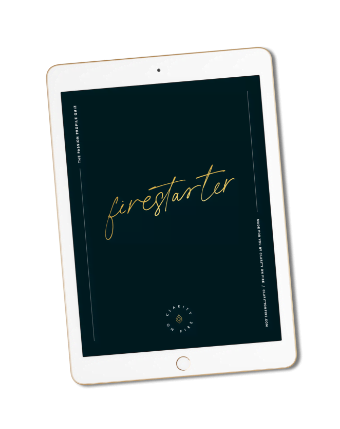Click the play button below, or subscribe and listen through our podcast on iTunes, Stitcher, Google Play, or Spotify.
Podcast: Play in new window | Download
Over a decade ago, I would’ve done anything to have a full-time coaching business.
I’m sure I bored my friends and family to death by incessantly talking about it. But I couldn’t help it — it was practically all I thought about.
I was beyond impatient, but it’s just because I wanted it so badly.
It seems so silly now, but I remember one desperate night writing a letter to God or the Universe or Life itself (whoever happened to be listening) saying that if only I could have a full-time business, I would be content. I wouldn’t need much else in life.
Hah!
I genuinely believed that if I got this thing I deeply desired, that everything else would fall into place and I’d be free of my intense longing.
I’d like to blame it on the naiveté of youth (I was 23, after all — brand new into the working world), but I think we all have moments like this, regardless of age or experience.
We want to get the thing we most desire, because then we could finally be rid of that painful feeling of wanting something we don’t have.
But here’s the thing: You’re ALWAYS going to want more.
I’ve had a full-time coaching business for many years now, and let me tell you, there’s so much more I want for this business and for my life in general.
Except, I’m no longer under any delusions that I’ll be perfectly content once I get all these new things I want.
If there’s one thing that’s universally true about human nature, it’s that we’re wired for desire. We’ll always be seeking more, better, different, the “next level.” Here’s why that’s great…
“OH GOOD, SOMETHING TO WANT”
Years ago, I heard Esther Hicks, one of my favorite spiritual teachers, recounting a story that I still think about all the time.
She was dusting off a shelf full of beautiful, expensive, delicate glass figurines that she and her husband, Jerry, had been collecting for years. The shelf was clearly on its last leg, because her light handling of it was enough to send it collapsing to the floor. All of her beautiful figurines, that had been painstakingly chosen over multiple years, shattered on the floor. She wanted to cry.
Jerry heard the crash and ran into the room to make sure she was OK. This man was clearly one of the most freaking evolved people on the planet because his first response when he saw the pile of shattered glass was, “Oh good, something to want!”
As in, “It was so nice to have those beautiful things for so long, and now it’s going to be so much fun to collect a whole new set.”
Can you imagine if your first response to things not working out, or feeling jealous of what someone else has, or longing for something you don’t yet have was, “Oh good, something to want!”
Jerry knew something that it’s taken me years to understand (and will likely take me many more years to fully embody):
Contentment doesn’t come from the absence of desire — it comes from appreciation of what you have AND anticipation of what’s coming.
Here’s how I’m trying to strike that balance:
1. APPRECIATE WHAT’S ALREADY GOING WELL IN YOUR LIFE
I know you’ve been told to practice gratitude. We’ve all been told this ad nauseum, so I’m not going to blow your mind by reminding you how important it is to feel more appreciation in your life.
Where I differ from other “experts” who preach the power of gratitude is that I don’t think you need to feel it all the time, and certainly not about everythingin your life.
In fact, trying to force yourself to feel grateful for things in your life that are, frankly, pretty crappy is not only impossible … it’s likely to backfire and make you even MORE resentful that things aren’t going the way you want.
If you ask me, gratitude only works if you genuinely feel it.
So choose a few things, experiences, or relationships in your life that you’re truly appreciative of — maybe even things that you wanted years ago and now finally have in your life — and remind yourself just how happy they make you on a daily basis.
We humans are notorious for quickly acclimating to a “new normal,” so unless you remind yourself of all of your previous desires that have become reality, you’ll naturally start to take them for granted.
2. QUIT JUDGING YOURSELF FOR WANTING MORE
I think it’s kind of funny (in a tragic sort of way) how so many of us feel guilty for wanting more than we have, when desire is the most normal human experience.
To be a person without desire is to be … well, a robot.
Without desire, all of us would be living lives of stagnation and complacency — a perpetual cycle of monotony. We’d have nothing propelling us toward anything, so we’d simply accept what was and never dream of more. And who wants that kind of life??
So if we’re all going to continually want more, from now until the end of our lives, then I think it’s about time we make peace with our desires.
Please, I beg you, stop trying to pretend you don’t want the things you want. Stop feeling guilty for having desires. And stop judging yourself for not being perfectly content with every single part of your life.
Having desires is healthy — it’s what makes you feel passionate, motivated, inspired, and lit up. It’s what makes you human.
3. VISUALIZE YOUR DESIRES
Desire can feel amazing if you translate it into anticipation, instead of lack and longing.
A client recently sent me a NYT article recounting a research study that explained how anticipating a vacation is actually moreenjoyable than being on vacation.
They quoted a psychology professor and happiness researcher who described how immersing yourself in anticipation of a vacation (or anything else you want) extends your enjoyment far beyond the actual experience.
And for those of you who are hesitant to get lost in a daydream or set your expectations too high, for fear of being disappointed, here’s a direct quote from that professor (who studies this stuff for a living!):
“It may sound counterintuitive, but this building up of positive expectations and excitement actually helps our minds smooth over any minor discrepancies if reality doesn’t quite measure up to the fantasy. So go ahead and assume it’s going to be wonderful.”
There you have it: permission to daydream, fantasize, and get lost in your desires!
4. COLLECT PROOF THAT WHAT YOU WANT IS POSSIBLE FOR YOU
The scariest part of having desires is the fear that you’ll never get the things you want.
Even if you try to change your attitude toward desire and transform it into juicy anticipation, you’ll still get tripped up if you have doubts that what you want is even possible for you.
That’s why it’s so important to collect proof.
I’ve said this before, but it bears repeating: If you’re struggling with thoughts like, “Is that even possible?” or “Is what I want too big?” or “Can people like me actually achieve that?” then it’s helpful to find proof the things you want are realistic.
For example, if you want to start a business, but you’re having doubts about whether you can make it, then find examples of other people (the more you can relate to them, the better) who have already done it.
Or if you deeply want a romantic relationship, seek out stories of people who found love in the most unlikely circumstances (which will make it feel way more plausible for you).
Or if you want to get healthier, then find examples of people who have reached your health goals (particularly people who started out at a similar or worse place than where you are now) to prove that it’s possible for you too.
As much as we’d all like to think of ourselves as unique, there’s no way you’re the first person to desire the things you desire. So the more proof you can find of people wanting (and getting!) the things you most want, the more hopeful you’ll feel that it can happen for you, too.
Was this just what you needed to hear today? How does this resonate with you? Share with me, in the comments!
Much Love,
Kristen (& Rachel)
IF YOU LIKED THIS, YOU’LL ALSO LOVE…
You can’t cure the human experience with Kyle R. (April 2018)
How much joy are you letting go to waste? (May 2018)
Do you want it? Or do you only think you SHOULD want it? (January 2019)
LINKS
Leave us a comment on this episode




Great article. It helped me accept my desires instead of feeling apologetic for having them. Having desires doesn’t mean I am not content. Thanks for posting this.
Sounds like this was exactly what you needed to hear — I’m so glad! 🙂
I really appreciated your point about how we’re constantly bombarded with messages about gratitude—often to the point of exhaustion—and how forcing gratitude can actually fuel resentment when things aren’t going our way. If I hear one more person tell me to “just be grateful,” I might actually scream.
Since being laid off in July 2024 (like so many others), I’ve had only a handful of interviews. Meanwhile, recruiters keep reaching out about roles that are completely misaligned—some I’m overqualified for, others I have zero experience in (like being an attorney). I’ve even been told I’m too smart and have too much management experience. I’m now thinking that it maybe time for a career and industry change. But that’s another conversation.
So no, I am not grateful for losing my six-figure job or my home in a state I absolutely loved. I’ve tried to fake gratitude, but it’s just not working. And as for desire? That only seems to make things worse—because I want what I want now, not in a year (or longer).